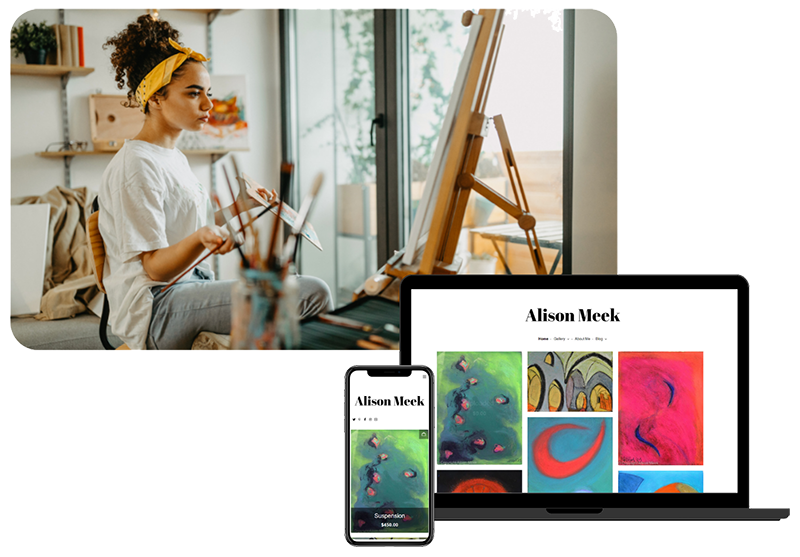If you dream of selling enough of your art to be able to leave the rat-race behind for a life of indulging in and reaping the benefits of your passion, you’re not alone! Many artists have a day-job to keep afloat and fit their art around what little time they have left. It can be a very daunting propspect to leave your job behind and concentrate solely on your art as your main source of income. You may worry that you won’t sell enough art, your income will be too erratic and that you’ll get into financial difficulties. Yet the fact that you’ll be able to focus ALL your working time on doing the thing that you love can make a huge difference. You’ll have time to market yourself, exhibit more regularly, get your website looking its best and of course concentrate on your art.

Once you’ve decided to go for it, whether it’s part-time or full-time, you’ll need to register yourself as self-employed. This is crucial and a legal requirement – you can’t sell art if you don’t do this! – so don’t start trading without having completed the process first! Before you register, you need to make sure that you have the skills to manage yourself and the commitment. It can be very rewarding to be your own boss but it certainly isn’t without it’s challenges! Here are some things to consider before taking that step:
Is this what you want to do?
You don’t have to be 100% sure but if you’re 50/50 you may need to reconsider: the first year can be challenging financially and personally and it really helps if your heart and mind are totally committed. Setting up on your own can put a strain on your personal relationships. You’ll be working long hours and juggling so many balls at once you may feel you’re about to drop the lot at any given moment! You’ll need the support of family, friends and your partner if you have one. If you have children, you’ll need to make adjustments to your time with them – do you have babysitters you can fall back on? Are you going to have to collect your children from school every day if nobody else can? If so, can you get enough work done during the week to earn sufficient money to keep afloat? If you’re worried, make plans before you begin.
Do you have children?
Tell your friends/family/partner what you intend to do and keep them informed as you go along so they can support you. Try to work out early on a plan for childcare if it’s applicable to your situation. Are there after-school clubs your children could join to allow you to work a bit longer? Is your partner able to and happy to make adjustments to their hours to take on some of the jobs you may have done up till now? Can you afford to pay for extra childcare if it’s needed? If you aim to enlist your family’s help, make sure that you communicate clearly how long you’ll most likely need their help and agree to re-assess after a period of time if you need their help for longer than you intended; that way everybody will be clear on their role and nobody will feel awkward that it’s getting a bit much but they’re not wanting to say. As you settle into your new working life, you’ll most likely find that things settle down into a routine and these issues resolove themselves with welcome solutions – be as flexible as you can as you go along and above all, don’t feel guilty if you find your time with your children is cut much shorter than you’re used to! Setting up is difficult but the pay-offs can be huge in terms of finance, personal satisfaction and work/life balance once you’ve got things under your belt.
Can you handle working alone?
If you’ve worked in an office or similar environment up till now, working for yourself may come as a bit of a shock! You may be lucky enough to find workspace in a shared studio but if that’s not a possibility, you need to be prepared for loving your own company for a while. Setting definite work times for yourself can be a help; that way, if you’re feeling the need to communicate with other people, you know that once a certain hour arrives and your work is done, you can reward yourself with a cuppa and a chat with a friend! Getting out and exhibiting can break the monotony of studio work and be a great social opportunity – not discounting a great networking opportunity. Or you may find that you can fit in time to join an artist’s group; just because this won’t generate income in itself doesn’t mean that it won’t benefit you in your working life. Keeping in the loop with other artists can lead to great opportunities to network, such as private viewings, gallery openings and exhibition invitations.

Are you ready to lose your perks & gain an overdraft?
Being self-employed gives you freedom with working your own hours and without a boss breathing down your neck – but it also takes away paid holiday, pension schemes, bonuses, work parties, pay rises and promotions! You may find yourself devoid of a holiday for the first year or two if you don’t have enough in the bank to pay for it so be prepared for this. However, it doesn’t mean you can’t take a break! It’s crucial that you take some time out for yourself the first year as you’ll certainly need it. Even if you can’t afford a big holiday, look at visiting friends in the UK or even just staying at home, taking the work phone off the hook and indulging in doing nothing! If you budget efficiently you may find getting you-time is easier than you thought.
Speaking of the bank – do you have savings you can fall back on during the first year? Setting up in business is notoriously stressful financially as you establish your position in your new work environment. You may need to look at a business loan or overdraft to carry you through – and if you do this you need to make sure you can afford the monthly repayments. It’s a good idea to look around at various schemes banks run to help small businesses setting up. They often offer low-interest overdrafts and loan arrangements tailored to meet the needs of those starting up. Having an overdraft if you’ve not needed one before can feel like a negative progression, but always bear in mind that this is a means to an end and once you’re profiting from your business, you can start to repay loans/overdraft payments and then start to reap the benefits of your profits! Having a loan if you need one will enable you to invest in areas of your work that will help you look and feel professional and confident. It’s better to invest in areas that you feel will guarantee a return rather than struggle financially with constant worry that you’re not looking or presenting your art to the standart that you feel comfortable with.
Personal skills that can smooth out the bumps!
Working for yourself can reveal personal skills that you never realised you possessed. If you’ve been used to working in a team environment, whether in the workplace or at art college or university, you may find the transition to working for yourself a strange one. The following qualities can help you on your way to presenting your art confidently, enthusiastically and in a way that draws potential buyers in.
* Self-confidence. Don’t apologise for your work; believe in it, believe in yourself as an artist and try not to compare yourself to others; it’s YOUR work you want to sell, not anybody else’s. A buyer can be inspired by an artist’s passion and belief in their work and your enthusiasm can prove to be infectious!
* Commitment. Agree from the outset that you’re going to be in this for the long-haul. There will be peaks and troughs during your first year but don’t expect everything to run smoothly – and when it doesn’t, don’t bail. Try to tackle each problem head-on and with a calm mind and objective to find a solution. That way you’ll find yourself coping with the good and the not-so-good which is essential to staying the distance when you’re self-employed.
* Initiative. You’re about to become your own boss, PA, publicity officer and admin staff! You’ll need to market your art to the public; use your imaginiation and take up any offer that comes your way, no matter how insignificant it may seem at the time. Word-of-mouth can be a great tool for getting your art out there. Make sure you have a website, business cards so people can look you up after seeing your art at an exhibition and so you can hand out to anyone you feel may be able to help you progress, a portfolio that is up-to-date and time to invest in marketing. It’s no use being the best artist in your area if nobody knows you’re there! Take initiative and sign up to galleries; getting invites to private views can be great for networking and getting an introduction to the gallery itself. Get involved in local exhibitions. Hold one of your own and notify the local media. Use any tactic you can think of but have fun with it and think outside the box!
* Being resiliant. You may come across criticism (constructive or not), setbacks and pitfalls along the way but try to stay focused and positive. Be able to take criticism. Be able to acknowledge when you’ve made a mistake, learn from it and put it down to experience. When the going gets tough, keep going and stay focused on whatever end goal it is that you’ve set yourself; whether it’s art-world domination or just a happy work/life/art balance with enough in the bank to enjoy your life!
Being self-employed has it’s moments. Long hours, tax returns (ugh!), accounting, working alone, no paid holidays – but the rewards can be huge. You work when you want. You do what you want. You can attribute your access to nobody but yourself and work wherever you choose. It’s a lifestyle many envy so keep at it, believe in yourself and in your art and celebrate every little success that comes your way! Enjoy the journey.
Next Part: Registering, National Insurance Contributions, accountants and tax returns – all the fun stuff!







